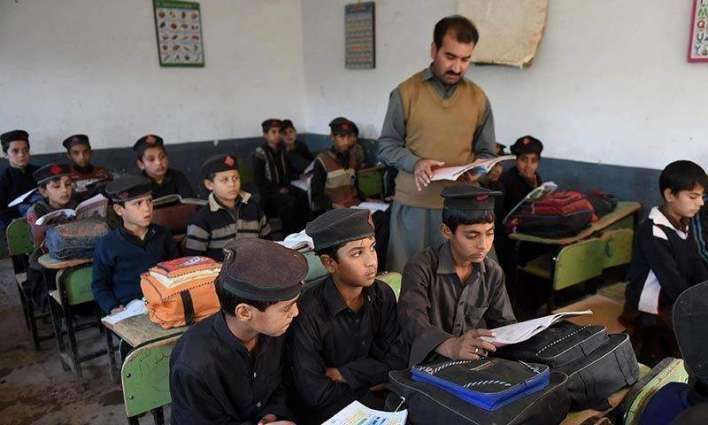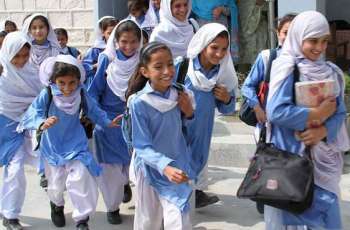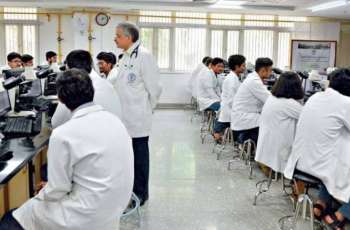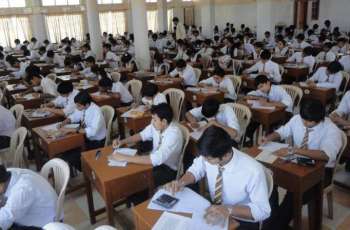The Department of International Department (DFID), The Saudi Fund for Development (SFD) and UNOPS Country Office in Pakistan sign a pilot project aimed at Improving Quality of Learning through Provision of Sustainable Renewable Energy Solutions in Primary Schools in Southern Districts of KPK Province, Pakistan
ISLAMABAD,(Pakistan Point News - 13th Feb, 2018) : The Department of International Department (DFID), The Saudi Fund for Development (SFD) and UNOPS Country Office in Pakistan sign a pilot project aimed at Improving Quality of Learning through Provision of Sustainable Renewable Energy Solutions in Primary Schools in Southern Districts of KPK Province, Pakistan The Khyber Pakhtunkhwa Minister for Education Muhammad Atif has said that by the end of the tenure of PTI led government in the Province each and every public sector school is not only completely provided all basic facilities but equipped with most modern facilities.
The provision of solar energy to the primary schools of the otherwise backward seven southern districts is one of such examples. He lauded the Saudi Funds for Development involvement and contribution to such education facilities and hoped that it will further cement the brotherly relations between the two nations. He was addressing on the occasion of the signing ceremony of the trilateral agreement among DFID, SDF and UNOP for the provision of solar electricity to the primary schools of seven southern districts of Khyber Pakhtunkhwa.
These Districts included D.I.Kha, Tank, Lakki Marwat, Bannu, Karak, Kohat and Hangu. The Minister said that “this initiative of providing schools of Southern districts of Khyber Pakhtunkhwa with solar energy is henceforth a contribution to the solution of energy crisis in the area and provides electricity in the schools for improved learning environment. This will have a positive impact on the enrollment rate of students, their interest to attend the school and study hard for a bright future.
Congratulations again to the Government of Khyber Pakhtunkhwa, Department for International Development (DFID), UK and Saudi Fund for Development (SFD) and UNOPS for making the decision to contribute to a greener, smarter future for Khyber Pakhtunkhwa.” The UNOPS Country Office in Pakistan, the Department of International Department (DFID) and the Saudi Fund for Development (SFD) signed a UNOPS pilot project aimed at Improving Quality of Learning through Provision of Sustainable Renewable Energy Solutions in Primary Schools in Southern Districts of KPK Province, Pakistan at the Serena Hotel.
High officials from the Government including Chief Minister Khyber Pakhtunkhwa, Minster Education, Minister Transportation, Education Secretariat, Directorate PEDO, Secretary Planning Development KP, Chief Foreign Aid Office and Secretary Energy were present at the occasion along with UN Resident Coordinator and heads of other UN agencies and representatives of foreign missions and donor agencies. The envisaged project is to be implemented by UNOPS Pakistan Office in partnership with the KP Education Department through the joint financial support of the Department of International Department (DFID) and the Saudi Fund for Development (SFD).
In total, the generous contribution from DFID and SFD for the duration of the project will amount to about US$ 8.5 million. During his speech the Regional Director Asia Region, Mr. Sanjay Mathur, said that “with respect to students, lack of school facilities affects health, behavior, engagement, learning, and growth in achievement. If Pakistani schools can save money on power, thousands of Rupees are suddenly freed up to put into other areas of teaching and learning.
In addition to enhancing education, solar panels in schools may motivate students to explore a new career field they otherwise wouldn't have considered. With pleasure I appreciate the efforts taken by UNOPS Pakistan for taking on this initiative and recognizing the need for it. Special thanks to Department for International Development (DFID), UK and Saudi Fund for Development (SFD) for monetarily recognizing the importance of this project and investing their gratitude and adding to the economy of the province of Khyber Pakhtunkhwa.
I also thank the Government of Khyber Pakhtunkhwa for their continuous support of this project and materializing this grant.” In her address Head of Office, United NationsResident (UNRC) Ms. Sarwat underlined that, “where the sun is shining, it's a bit like a tap running, with no one collecting the water. We're wasting perfectly good, free power. By investing in solar power on their large estates, schools can save thousands of Rupees of money spent on in-house electricity bills.
Providing with basic facilities like the provision of energy solution illustrates a bright future for children of this region. Also by having solar panels we are making a statement about how we feel about the environment. Generating enough clean electricity to power 1959 boys and girls schools could save thousands of volume of carbon emissions off the environment.” While addressing the ceremony Ms. Joanna Reid, Head of Department for International Development (DFID) said, “I am delighted to be here launching this project with the Saudi Fund for Development; the first ever collaboration between DFID and the Saudi Fund for Development.
This project aims to provide a sustainable way for children to have electricity at school for the first time. Not to forget that electricity also gives children a chance to connect to other communication and open up new possibilities for learning. The funds provided will enable UNOPS to install off-grid solar power systems in nearly 2000 unserved schools.” In his address the SFD Head Mr. Yousef Ibrahim Albassam said, “I am delighted to be launching this project in collaboration DFID.
I also thank UNOPS and Government of Khyber Pakhtunkhwa for their continuous support and cooperation in the implementation of this project. This will be a turning point in the implementation of large-scale renewable energy projects. It will empower the students, provide them with opportunities and lead the province to economic and social development.” The Islamabad based ambassador of Saudi Arabia Prince Nawaf Saeed Ahmed Al-Malkiy said that it is for the first time that the SDF was contributing to such a project and assured that it will further be extended.
The United Nations Office for Project Services (UNOPS) is an operational arm of the United Nations, helping a range of partners implement around $1.4 billion worth of peace-building, humanitarian and development projects every year. UNOPS strives to become a leader in sustainability. We are working closely with governments and communities to ensure increased sustainability for the projects we support. As mandated by the UN General Assembly UNOPS specializes in Sustainable Infrastructure, Sustainable Procurement and Sustainable Project Management.




